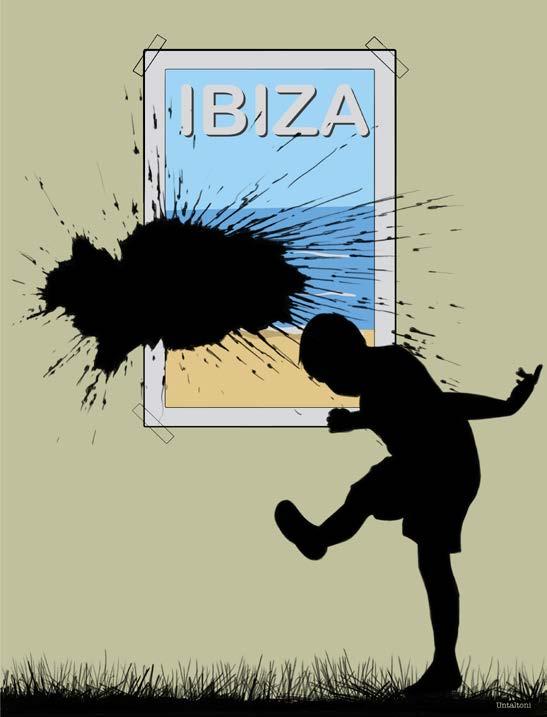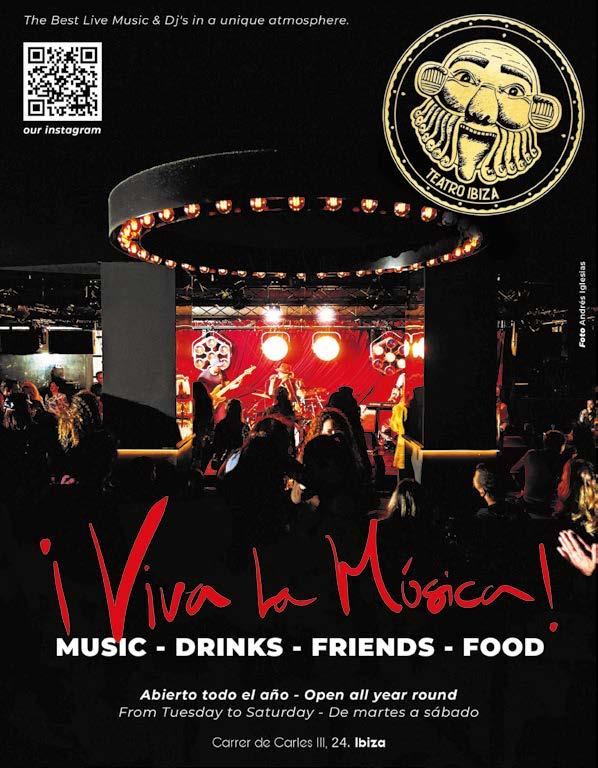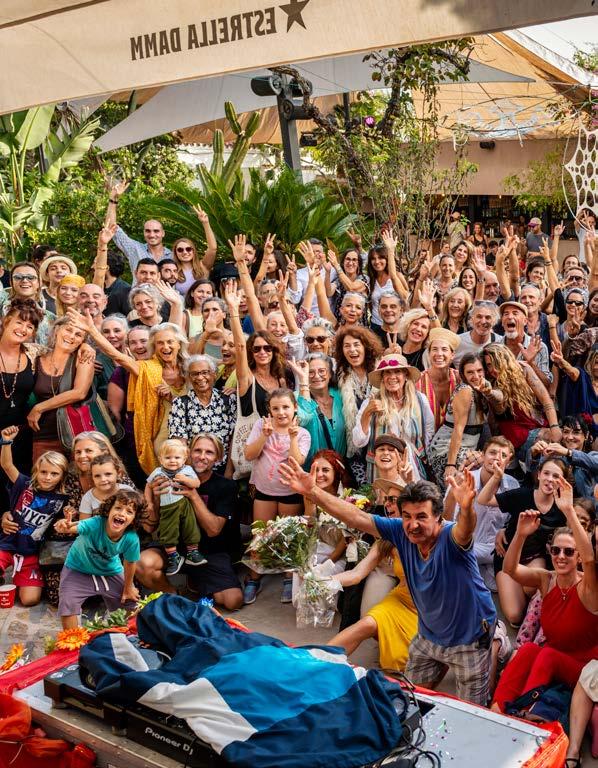
4 minute read
EXCESO DE VIDA
Excess Of Life
Si mai heu pensat que sols hi ha honor en l’orb destí de la sofrença, contempleu-los: infants extasiats que xipollegen vora mar tot alçant castells en les onades esllavissadisses entre els dits.
Advertisement
If you’ve ever thought that there is only honour in the blind destiny of sufering, watch them: children in ecstasy, splashing around by the sea, raising castles in the waves that collapse between their fngers.
Francesc Parcerisas (Paisatge)
Me pasé años trabajando en un despacho que tenía, justo enfrente de mí, un póster con la fotografía del mar y un rótulo que ponía Eivissa.
I spent years working at an office where, on the wall right in front of me, there was a poster with a picture of the sea and a sign that read “Eivissa”.
A veces, entre llamada y llamada, exhalaba el poco aire que quedaba en ese despacho y cerraba fuerte los ojos para transportarme a ese mar, al mar de mis infancias: al de Talamanca, tan cerca de casa, al de Sa Caleta, Pou d’es Lleó, Ses Salines o al de Cap d’es Falcó, donde se bañaba mi tía Berna.
Sometimes, between calls, I would exhale the last of the air left in that office and close my eyes tightly, transporting myself to that sea, the sea of my childhood: the sea of Talamanca, so close to home, the sea of Sa Caleta, of Pou d’es Lleó, of Ses Salines and the sea of Cap d’es Falcó, where my aunt Berna used to swim.
Mi madre decía que no entendía cómo la gente se iba al Caribe teniendo el azul del agua de Formentera. Mi tía Berna lo suscribía, sentadas las dos junto a sus senallons, muertas de la risa por cualquier ocurrencia, con su “copita” de vino blanco mientras mi prima Ana y yo merendábamos un flaó o unas orelletes de Can Vadell.
Llegamos a Ibiza en 1974 en el Ciudad de Barcelona de la Transmediterránea, mi madre, sus seiscientos blanco y mi pequeño yo de casi cinco años. Alquilamos un minúsculo apartamento frente a la Illa de ses Rates, y de los primeros meses apenas recuerdo más que la luz de la isla, ese azul único del mar, la silueta de Formentera y una mancha de humedad que teníamos en la pared que no hacía más que crecer. Poco después nos instalamos en Can Pep Simó, la urbanización con los apartamentos y chalés que construyó Josep Lluís Sert.
Mi T A Viv A Con El Poeta Francesc
PARCERISAS EN LO ALTO DE ES PUIG, EN UNA COMUNA HIPPIE ENTRE SANT ANTONI Y SANT JOSEP. MI PRIMA Y YO ÉRAMOS LOS ÚNICOS NIÑOS ALLÍ
Mi tía vivía con el poeta Francesc Parcerisas en lo alto de Es Puig, en una comuna hippie entre Sant Antoni y Sant Josep. Mi prima y yo éramos los únicos niños allí, donde entraban y salían jóvenes con el pelo largo, camisas hippies, pantalones de campana y, muchos de ellos, fumando porros sin parar. Nos daban hígado para comer, la lumbre del quinqué era nuestra única fuente de luz, acudíamos al pozo a por agua y gracias a la leña que recogíamos cada tarde en el bosque podíamos calentarnos en la chimenea. Alguna noche, incluso, llegamos a dormir a la intemperie mientras tratábamos de descifrar el nombre de las estrellas. La parte central de la comuna era una casa payesa, donde a su alrededor se fueron construyendo, de manera
My mother used to say she couldn’t understand why people went off to the Caribbean when they had the blue water of Formentera right there. My aunt Berna would agree, the two of them sitting with their senallons (beach baskets) beside them, laughing their heads off at the slightest witticism, with their “little glass” of white wine, while my cousin Ana and I snacked on a flaó or some orelletes from Can Vadell.
WE CAME OVER TO IBIZA IN 1974 ON TRANSMEDITERRÁNEA’S ‘CIUDAD DE BARCELONA’ SHIP; MY MOTHER, HER WHITE SEAT 600 AND MY SMALL SELF, AT ALMOST FIVE YEARS OLD
We came over to Ibiza in 1974 on Transmediterránea’s Ciudad de Barcelona ship; my mother, her white SEAT 600 and my small self, at almost five years old. We rented a tiny apartment that looked out at the islet, Illa de ses Rates, and from our first months there, I barely remember much other than the light of the island, that singular blue of the sea, the silhouette of Formentera and a dampness stain on the wall that only grew larger. Not long after that, we moved into Can Pep Simó, the residential complex made up of apartments and villas built by Josep Lluís Sert.
My aunt lived with the poet Francesc Parcerisas at the top of Es Puig, in a hippie commune between Sant Antoni and Sant Josep. My cousin and I were the only kids there; it was a place where young people with long hair, hippie shirts and bell-bottom trousers came and went, many of them smoking joints non-stop. They would give us liver to eat, the glow of the kerosene lamp was our only source of light, we would go to the well for water and every evening we would warm ourselves by the fire, thanks to the firewood we collected in the forest. Some nights we even slept outside in the open while trying to decipher the names of the stars. The central area of the commune was a farmhouse. Around it, a number of bungalows gradually and erratically sprang up. The bathroom was outside, so you were best off not having to get up in the middle of the night. The most frequently heard word was irregular, algunos bungalows. El cuarto de baño se hallaba afuera, más te valía no tener que levantarte a medianoche. La palabra más escuchada era “fondo común”, y desde la cocina mi tía me llamaba a veces para que la acompañara y le diera conversación. Escuchábamos la radio ya que, naturalmente, rechazaban tener televisión y cada dos por tres, en esas cuestas infernales, se pinchaba alguna rueda del dos caballos amarillo.

Los mayores practicaban nudismo en las rocas —“el despelote”— mientras nosotros, avergonzados, no nos quitábamos el bañador ni por asomo. Nos encantaba ir a la playa, especialmente a la caída de la tarde, donde saltábamos las olas mientras Francesc pensaba el poema que luego escribió inspirándose en nosotros “amb records que no se si ells tindran mai”.










